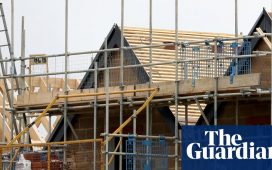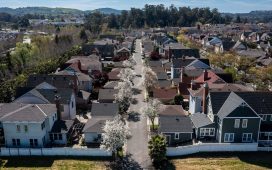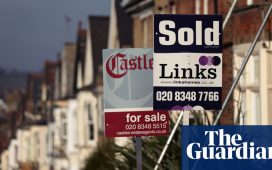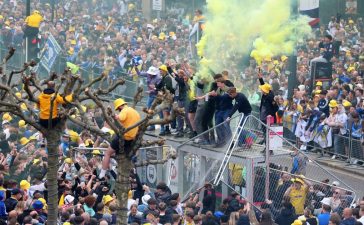When plans for the Oceanwide Plaza development were unveiled in 2015, it was billed as a gleaming symbol of downtown Los Angeles’ renaissance.
The development’s Chinese backers laid out a $1bn vision of 500 luxury condos, a five-star Plaza Hotel and retail space — all sitting in a prime location just across from the arena where the LA Lakers play basketball. A 700-foot LED screen would wrap around the building, giving a pulse to the burgeoning entertainment destination.
Today, however, Oceanwide Plaza remains unfinished and its parent company is out of money. Instead of a prime downtown destination, Oceanwide has become another vexing problem for LA officials who are already grappling with a homelessness crisis and a serious lack of affordable housing.
Oceanwide’s three unfinished towers are covered with the work of seemingly gravity-defying graffiti writers, whose spray-painted tags gained worldwide attention in January when the Grammy Awards were held across the street at the Crypto.com Arena. The publicity attracted even more graffiti artists and other daredevils.
In the weeks since, paragliders have posted videos of themselves diving off the structure’s bare girders 20-plus storeys in the air. For LA mayor Karen Bass, that was the final straw.
“I guarantee you tragedy will take place there if that place is not boarded up quickly,” Bass told a local television station this week. “The owner should reimburse the city for every dime.”
The city has given Oceanwide until this weekend to secure the area around the site. If the company fails to do so, then the job — and most likely the expense — will fall to the city of Los Angeles.
Kevin De León, a member of LA’s city council, issued a motion this week in which he called Oceanwide Plaza a “black eye on an otherwise vibrant part” of downtown LA. Besides the graffiti and parachuting, bandits had been stripping the building of copper wire, he said.
His motion, backed by the rest of the council, calls for Oceanwide to build sturdy fences around the site, hire extra security, remove the graffiti and clear public space that has been obstructed by the project.
By the end of the week, few were holding out hope that Oceanwide would meet the deadline — or even respond at all. If that is the case, city officials say they would seek to reclaim the estimated $3.8mn needed to secure the site from the company.
The development’s problems began as US-China tensions mounted during the Trump administration. China’s red-hot property sector began to cool off, and Oceanwide Holdings was removed from Hong Kong’s Hang Seng Midcap index in 2017. Two years later work stopped at Oceanwide Plaza as contractors complained of unpaid bills.
On January 3, its parent company filed papers with the Hong Kong Stock Exchange announcing that it was winding up the group and appointing a liquidator. Attempts to reach China Oceanwide Holdings representatives by telephone and email this week were unsuccessful.
If LA has to assume responsibility for safeguarding the site, as many expect, the question becomes what happens next. City officials were unlikely to want to take over the site, said Donald Spivack, a former member of LA’s Community Redevelopment Agency who now sits on the faculty at the University of Southern California. The city would become liable for accidents and other problems on the worksite.
“I doubt if the city will want to try to take over the property itself,” Spivack said. “That would be a big thing and it’s something that I would expect the city would not want to get themselves entangled in, effectively becoming the property owner.”
The unfinished development is less than two miles from LA’s Skid Row district, where an estimated 6,000 homeless people live. Some Angelinos have said Oceanwide Plaza should be converted into housing for homeless and low-income people.
But the building had been sitting unfinished for nearly five years, and it could take up to a year of repairs just to get to the point where construction could resume, Spivack said. Completion could then take another year or two.
“In terms of it being a near-term solution for the housing crisis that we have, I think it’s unrealistic,” he said. “It’s not something where you could go in there, do a little patchwork and open it up [as homeless residences] in six months. I don’t think that’s at all possible.”
There were other obstacles to the idea of converting the building into housing for the homeless, said Richard Schave, an LA historian, preservationist and tour guide.
“No one wants to have the largest public housing project in the state of California next to” the Crypto.com Arena, where the Lakers, LA Clippers and Los Angeles Kings ice hockey club play, he said.
If a buyer were not found for the building, another possibility was demolition, which would require a lengthy review process by the city, he said. “To demolish a building, the building safety commission has to go through an incredibly complicated legal process,” he said. “It would take a huge amount of space in a landfill and would create a huge amount of pollution. We’ve never done anything like this in the heart of the city.”
For city council member de León, the whole debate over Oceanwide was an unwanted distraction as the city faces larger problems. “It upsets me greatly that we’re dealing with the homelessness crisis in LA, we’re dealing with the housing affordability crisis in LA and we should be focusing . . . all of our resources there,” he said this week.
Additional reporting by William Sandlund in Hong Kong











